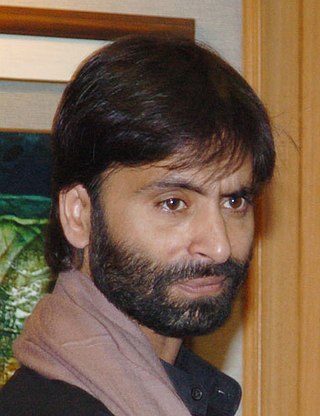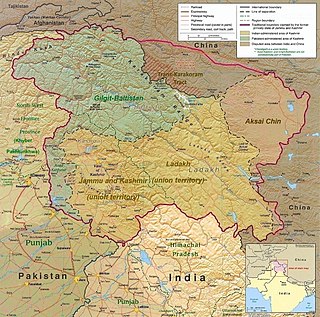
The insurgency in Jammu and Kashmir, also known as the Kashmir insurgency, is an ongoing separatist militant insurgency against the Indian administration in Jammu and Kashmir, a territory constituting the southwestern portion of the larger geographical region of Kashmir, which has been the subject of a territorial dispute between India and Pakistan since 1947.
Operation Tupac is the codename of an alleged military-intelligence contingency program of Pakistan's Inter-Services Intelligence (ISI).

The Kashmir conflict is a territorial conflict over the Kashmir region, primarily between India and Pakistan, and also between China and India in the northeastern portion of the region. The conflict started after the partition of India in 1947 as both India and Pakistan claimed the entirety of the former princely state of Jammu and Kashmir. It is a dispute over the region that escalated into three wars between India and Pakistan and several other armed skirmishes. India controls approximately 55% of the land area of the region that includes Jammu, the Kashmir Valley, most of Ladakh, the Siachen Glacier, and 70% of its population; Pakistan controls approximately 30% of the land area that includes Azad Kashmir and Gilgit-Baltistan; and China controls the remaining 15% of the land area that includes the Aksai Chin region, the mostly uninhabited Trans-Karakoram Tract, and part of the Demchok sector.

Yasin Malik is a Kashmiri separatist leader and former militant who advocates the separation of Kashmir from both India and Pakistan. He is the Chairman of the Jammu Kashmir Liberation Front, which originally spearheaded armed militancy in the Kashmir Valley. Malik renounced violence in 1994 and adopted peaceful methods to come to a settlement of the Kashmir conflict. In May 2022, Malik pleaded guilty to charges of criminal conspiracy and waging war against the state, and was sentenced to life imprisonment.

Sikandar is a 2009 Indian crime drama film written and directed by Piyush Jha. The film features Parzan Dastur in the title role with R. Madhavan, Sanjay Suri and Ayesha Kapur in pivotal roles. The film has terrorism in the Indian state of Jammu & Kashmir as its backdrop. The film was known in its production stages as Foot Soldier. The film was released on 21 August 2009.
2003 Nadimarg massacre was the killing of 24 Kashmiri Pandits in the village of Nadimarg in Pulwama District of Jammu and Kashmir on 23 March 2003. The Government of India blamed militants from the Pakistan-based terrorist group, Lashkar-e-Taiba but failed to secure convictions.

Ashvin Kumar is an Indian filmmaker. He wrote / directed and produced India's only Oscar-nominated short film, Little Terrorist (2004), with his debut film Road to Ladakh being released in the same year. He also made the feature-length documentary films Inshallah, Kashmir (2012) and Inshallah Football (2010); feature-length thriller The Forest (2012); and coming-of-age tale Dazed in Doon (2010).
Human rights abuses in Jammu and Kashmir range from mass killings, enforced disappearances, torture, rape and sexual abuse to political repression and suppression of freedom of speech. The Indian Army, Central Reserve Police Force (CRPF), and Border Security Personnel (BSF) have been accused of committing severe human rights abuses against Kashmiri civilians. According to Seema Kazi, militant groups have also been held responsible for similar crimes, but the vast majority of abuses have been perpetrated by the armed forces of the Indian government.
Human rights abuses in Kashmir have been perpetrated by various belligerents in the territories controlled by both India and Pakistan since the two countries' conflict over the region began with their first war in 1947–1948, shortly after the partition of British India. The organized breaches of fundamental human rights in Kashmir are tied to the contested territorial status of the region, over which India and Pakistan have fought multiple wars. More specifically, the issue pertains to abuses committed in Indian-administered Kashmir and in Pakistani-administered Kashmir.

Inshallah, Football is a documentary film by Ashvin Kumar about an aspiring footballer who was denied the right to travel abroad on the pretext that his father was a militant in the 1990s. The film was completed in 2010, and has faced difficulties getting released in India. The film's first screening in India at the India Habitat Center received this review from Tehelka magazine, 'Kumar's camera catches the irony of Kashmir's physical beauty, the claustrophobia of militarisation, the dread and hopelessness of children born into war and the nuances of relationships. It also filters the inherent joie-de-vivre of youth, even if that flows uneasily with Kashmir's collective memory of unmitigated grief...There is no better way to understand Kashmir right now.'. The film was shot by Kumar himself using five different camera formats "There is a rough, almost unpolished, feel to Inshallah, Football. The narrative runs unfettered, with an energy of its own." says Tehelka, "We shot with five different cameras, from DSLRs to the best equipment. The idea was to watch life unfold and get under the skin of the audience." adds Kumar.

The Exodus of Kashmiri Hindus, or Pandits, is their early-1990 migration, or flight, from the Muslim-majority Kashmir valley in Indian-administered Kashmir following rising violence in an insurgency. Of a total Pandit population of 120,000–140,000 some 90,000–100,000 left the valley or felt compelled to leave by the middle of 1990, by which time about 30–80 of them are said to have been killed by militants.

Kashmiri cinema is the Kashmiri language-based film industry in the Kashmir Valley of the India,- administered union territory of Jammu and Kashmir. The first Kashmiri feature film, Mainz Raat, was released in 1964. In 2023, Welcome to Kashmir, directed by Tariq Bhat, became the first-ever Kashmiri-produced Bollywood film to release in Kashmiri cinemas.

Burhan Wani was a commander of Hizbul Mujahideen, a pro-Pakistan Kashmiri Islamist militant group participating in the anti-Indian insurgency of the Kashmir conflict.
Farooq Ahmed Dar known by his nom de guerre Bitta Karate, is a Kashmiri-separatist militant, who currently serves as the chairman of the Jammu Kashmir Liberation Front (R) in the Kashmir Valley of Jammu and Kashmir, India.
Zakir Rashid Bhat was a Kashmiri separatist who became the commander of Hizbul Mujahideen after the killing of Burhan Wani and Sabzar Bhat, who were the former commanders of the same outfit. He later became the chief of Ansar Ghazwat-ul-Hind.

Ansar Ghazwat-ul-Hind is an Al-Qaeda-affiliated Islamist militant group active in Kashmir. The group's stated objective is to create Kashmir as an independent Islamic state under Sharia law and jihad against India.

Shikara is a 2020 Indian Hindi-language romantic drama film produced and directed by Vidhu Vinod Chopra. The film is based on the Kashmiri pandit exodus of 1990. The story revolved around the love story of Shanti and Shiv Dhar, who are Kashmiri Pandits in the backdrop of the Exodus of Kashmiri Pandits from Kashmir. The book Our Moon Has Blood Clots by Rahul Pandita has inspired many parts of the movie.
Abdul Hamid Bhatt was a commander in the Islamist militant organisation Hizbul Mujaheddin. He was killed in an encounter on 13 March 2000 by Indian security forces. Hamid Gada, at the time of his death, was the most wanted North Kashmiri militant. He had been called "Jammu and Kashmir's most important terrorist leader" by Indian journalist Praveen Swami, responsible for the massacres of numerous Kashmiri Hindus, including the 1998 Wandhama massacre. Press Trust of India said that in total, over a period of ten years of militancy, he was responsible for killing over a hundred civilians.

The Kashmir Files is a 2022 Indian Hindi-language drama film written and directed by Vivek Agnihotri. The film presents a fictional storyline centred around the 1990 exodus of Kashmiri Hindus from Indian-administered Kashmir. It depicts the exodus and the events leading up to it as a genocide, a framing considered inaccurate by scholars. The film claims that such facts were suppressed by a conspiracy of silence.

The People’s Anti-Fascist Front (PAFF) is a militant terrorist organization actively engaged in insurgency in Jammu and Kashmir, an ongoing armed conflict between Kashmiri separatist militants and Indian forces in Jammu and Kashmir. PAFF was established in 2020 by Jaish-e-Mohammad or Lashkar-e-Taiba, two Pakistan-based Jihadist groups.












